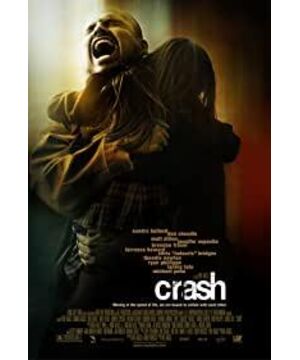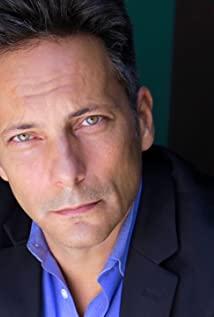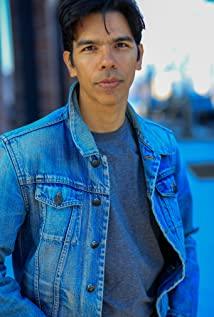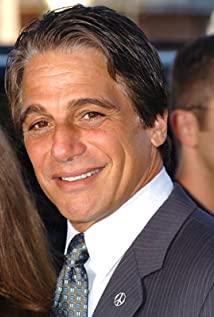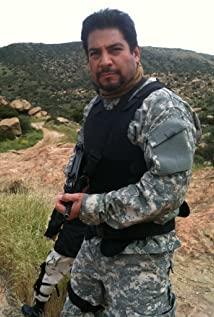★★★★★ Warning: Seriously leaking the plot
. The first time I didn’t pay attention to the story, the whole story took place in nearly 24 hours. There were too many things I didn’t pay attention to at the first time. . The 52-year-old Paul Haggis is good at weaving longer than tailoring. He is the screenwriter, director and producer of this film. Before shooting this film, he did a TV series for nearly 30 years, and after that, he Easily obtained the qualification of screenwriter [Million Dollar Baby], that movie lost his screenwriter and won an Oscar for Best Picture. [Crash] didn’t get the Oscar’s favor, but in just one year, it became the 47th most popular movie in IMDB, and Rodriguez’s aggressive and crazy work [Sin City] also But ranked 90th. What kind of dazzling box office a movie gets is of little significance to movie fans, but if a movie enters the list of "IMDB 100 Best Movies"-after 2000, a new movie wants to squeeze into this list. It becomes more and more difficult-it means that it will almost certainly become zero distance between it and the fans.
Paul Haggis was born in London, England in 1953. He is now in his early fifties and is in his prime. After [Crash] and [Million Dollar Baby], he successfully jumped out of the television world and became a Hollywood star. With constant filming appointments, he already has four scripts to write, not including the new episode 007 story that was once rumored[ Casino Royale] Casino Royale. On this work schedule that has been scheduled to 2007, the most notable is the World War II film [Flag of Father] Death and Dishonor (2007), which will be directed by Clint Eastwood. This film It will show the cruel reality of the "Battle of Iwo Jima" in World War II. In addition, [Honeymoon with Harry] Honeymoon with Harry (2006) will be written and directed by Paul Haggis. Other confirmed screenwriters include [Death and Dishonor] Death and Dishonor (2007) and [The Last Kiss] (2006).
The above can be regarded as a little background and tidbits of the movie [Crash]. Next, let’s talk about the movie——
1. The story
In chronological order, I will first try to tell you a complete story:
Los Angeles in the night.
Two black gangsters just came out of the cafe. One of them has been complaining about the discrimination against blacks by the white society in Los Angeles, while the other disagrees. Not far away came the young and promising District Judge of Los Angeles. He was running for dinner and came out to accompany his wife for dinner that night. They got into their spacious black jeep and were about to start, but they were robbed by the two black gangsters. Two robbers drove to a black colony to sell the stolen goods, and accidentally injured an Asian driving a white truck on the road. They threw him at the hospital door and hurried away. When the judge and his wife returned home, the wife immediately flew into a rage and made a lot of racist remarks. She didn't care about the feelings of the black female police officer who came to investigate. Even the locksmith with tattoos on her shoulders was scolded. At the same time, the Los Angeles police are searching the city for two black men who drove a black jeep. Officer Ryan, who had just quarreled with a black woman on the phone, drove a suspicious vehicle with his young deputy. After slowly approaching, he had discovered that this was not the car they were looking for, but he still ordered the two people in the car to get out of the car for inspection. A middle-class couple in the car had just returned from the awards ceremony. The man was a black man, a well-known TV director. When he was forced to stop, his white wife was giving him oral sex. In the beginning, the typical Hollywood couple didn’t take everything in front of them seriously, but Officer Ryan was obviously deliberately looking for faults, and the atmosphere suddenly became tense. This ill-intentioned police officer seemed to be able to pull out his gun at any time to kill. These two American citizens who are not very submissive. In order to avoid accidents, the TV director had to admit defeat and obediently watched his hands rubbing around his wife. When Officer Ryan was satisfied, he let them go. They returned home and finally had a big fight in the bedroom. Both sides felt wronged and angry, but they had nowhere to vent. Officer Ryan returned home, his father was suffering from a urinary tract infection, and his life was obviously not going well.
A Persian businessman living in a dangerous community decided to buy a gun because the gangsters in this community often went to his small grocery store to make trouble. This impulsive old man clashed with the gun shop owner and was bombarded by the guards in the store. When going out, his daughter bought him a pistol and selected a special box of bullets. The door lock of the grocery store was broken, and the Persian merchant called and invited the locksmith, who was the one with tattoos on the shoulder who had just changed the lock for the hall of the judge's house. He changed a door lock for the Persian and reminded him that he should also change the door. Unexpectedly, the Persian became furious and thought that the locksmith was incapable of fixing the lock. Angrily, the locksmith confiscated the money and left.
Inspector Don Kidu is also a black man. He is dealing with a complicated police shooting. He has to deal with his white girlfriend as a colleague and his unconscious and drug-addicted mother. The mother always takes the youngest son away from home. The responsibility of running away is counted on his head. He didn't know that his brother had just robbed the judge's jeep tonight.
The next day, during the day.
The TV director and his wife clashed again on the set. His wife drove away in a daze, while he drove around in the street. His wife was involved in a car accident at the entrance of the highway and her body was stuck in the carriage. A patrol car drove up. The car was sitting on the police officer Ryan who "legally molested" her last night-Officer Ryan's partner has been Take the initiative to transfer, he now has a new partner. Officer Ryan climbed into the overturned carriage and tried to rescue the woman, but the woman recognized him and screamed desperately. The situation was critical, and soon the leaked gasoline caught fire. Officer Ryan was dragged out of the car by his colleague, but he climbed in again and finally rescued the poor woman before the car exploded. The fate of everyone seems to have undergone a huge reversal from this moment.
Two black gangsters went to grab the car again. This time they ran into the TV director who was on the fire. The TV director hit them. A police patrol car happened to come. One gangster jumped into the jeep and ran, and the other jumped. Go over the fence and escape to the depths of the community. The TV director also rushed into his car until the police car stopped them. The TV director hid the pistol with the pistol in his waist and got out of the car. He was extremely emotional and might have a gunfight with the police at any time. Coincidentally, there was a young partner in the police who was the young partner of Officer Ryan the night before. Recognizing the black man in front of him, he closed a circle for him and avoided a bloodshed. The gangster hid in the car, witnessing all this.
The Persian merchant’s grocery store was ransacked, everything was robbed or smashed, and there were signs on the wall cursing the Arabs. The insurance company believed that the locksmith had reminded them to change the door. This time the loss was the Persian merchant. No compensation will be made if it is caused by negligence. The Persian businessman faced the destruction of his whole life and was so angry that he lost his mind and brought a new pistol to avenge the locksmith. At the door of the locksmith’s house, the old Persian man fired a shot at the locksmith, and the locksmith’s daughter rushed over. The shot was hitting the little girl’s back—but the little girl was not dead. The gun was loaded with Empty package bombs. The Persian businessman was stunned. He thought he had seen a real angel.
For the sake of the future, Inspector Don Kidu made a deal with the judge and settled the difficult case before him. He returned home and bought some food for his mother, who was sleeping soundly. The judge's lonely wife was at home alone and accidentally fell down the stairs. She was bored in bed and called all her friends, only to discover that no one really cared about her, except for her housekeeper.
Finally, night fell again.
The gangster who once robbed the judge wandered outside the city alone, and he was also the brother of the detective who ran away from home. He got on a passing car, and it happened that it was the young police officer who was driving home from work. The two spoke at odds, and then the police mistakenly thought that the black man was going to take a gun, and shot the other side preemptively. When he discovered that the black man was just an angel doll, it was too late. He pushed the black man's body out of the car, left it on the side of the road, and found a place to burn his car. Another black gangster "picked up" a white truck on the side of the road. He didn't remember the driver of this car, but he was actually the Asian man he injured the night before. He drove the car away and prepared to sell it, but found that the carriage was full of stowaways from Asia (the injured Asian was a snakehead). The gang wanted to buy these Asians, but the gangster refused to agree. He drove to Chinatown, released the group of people, and drove away. At this time, there was another daily traffic accident at the crossroads, and people were arguing and quarreling together... It
suddenly fell in Los Angeles for the first heavy snow in 20 years...
2. The grammar
film is a bit like Paul Thomas. Anderson’s [Magnolia] is also a group show, it is also a lot of clues, a lot of characters and events, this film is obviously influenced by the old director Robert Altman, and the role of the judge’s wife is almost from the [short film collection] A middle-class woman who came out directly, but overall, the film’s critical color is less [short film collection]. Perhaps because Paul Haggis is too familiar with TV, he can't get rid of the grammar of popular drama, and weaves too many dramatic elements. He talks about fate and choice, coincidence and inevitable, although on the surface he is writing about racial discrimination, in fact the so-called race Discrimination. He didn’t intend to dig deeper. He still insisted on talking about life. So some people after watching this movie feel that although it is comfortable, it is always a little soft. Si, he is not a sociologist, not a film master who is accustomed to criticism and mockery. He is good at analysis and judgment, but he is not eager to draw conclusions. Hollywood does not need him to make conclusions. He knows this well. Therefore, he just managed to make the moving scene before the camera as beautiful as possible, especially to be emotional, and when the ending music sounded, it was really a bit emotional.
Multi-threaded narrative, this is the valuable experience of TV series through years of groping. How to intersperse characters does not have to be as precise as an instrument like Robert Altman. As long as the rhythm is maintained, it is also possible to make a movie according to the number of TV series. good. The most important thing here is to create incidents, continuous incidents. The whole movie is composed of the reactions of the characters. It is a weaving of events, a perfect weaving. Music is very important. Just like empty shots that have something to say, music is like a blank space, which can relieve the pressure of the audience and create reveries in the gaps in the flow of events.
3.
The biggest problem with this film may be that the story is too round, too round, and not powerful enough! There are too many coincidences, too many accidents, and even too much like a popular drama. The traces of these artificial arrangements are too exposed and weaken the film's ideological improvement space. This problem is common to many American playwrights and first-line directors, not just Paul Haggis. Because Hollywood’s game rules are established and require directors to cater to the audience, too many directors are accustomed to thinking about their work from the audience’s perspective, and they just overcorrect and compromise too much. Paul Haggis’s problems will be exposed again in his future films. As an excellent screenwriter and quite a high-level director, I hope he can do a little derailment while getting close to Oscars, especially When adapting "Flags of Fathers", don't cater to Hollywood producers and a small number of film critics too much. The work he collaborated with Clint Eastwood again should have the potential to surpass Spielberg’s [Saving Private Ryan] and become the most powerful work of the old man Eastwood. I hope Hopefully.
4. Theme
Many people have confuses this movie with the bizarre pleasure filmed by David Cornenberg in 1996, because the English name CRASH is exactly the same, and they all have the theme of collision and car crash. The difference is that Konnenberg likes to dig inward into the fog of human sexual psychology, while Paul Haggis tends to explore and outline the life enlightenment brought by interpersonal conflict and cultural conflict. When you watch this movie, your first reaction should be, ah, this is a movie about the issue of racial discrimination in the United States. See how deeply he speaks and how rich and three-dimensional the examples he gave! Yes, people have the right to understand this way, but Paul Haggis clarified in an interview that what I want to say is not racial discrimination, but a person’s psychological problems. Everyone in the movie, every one of them faces a difficult problem, or involves too many crimes, or is a crazy colleague, or is humiliated, deprived of self-esteem, or taken away from all wealth , But everyone reacts differently to embarrassment, and different reactions lead to completely different endings-it is very likely that the biggest problem you face lies with yourself.
We can reflect on these characters along his line of thought, starting with the most irrational Officer Ryan. Officer Ryan was not an executioner. He insulted a woman the night before, but saved the woman's life the next day. When he insulted this woman, I was worried about whether he would suddenly shoot and kill these two people for no reason, like the middle school student in "Columbine's Bowling", but he didn't. In the evening, he came home and helped his father to get up in the toilet, watching the old man being tortured by the illness. I was worried again, would he suddenly run into the kitchen and hack his old man to death with a kitchen knife? This is because he insulted that woman and caused me psychological damage. He left a shadow in my heart, making me always suspect that he is a pervert, and may even be a pervert who has killed many people. This is cause and effect. But the next day, when he risked his life to save the woman, I suddenly felt at a loss. How should I characterize this person? He is not a pervert, he is just an anxious ordinary policeman with a little misbehavior. A potential executioner was forgiven by me for saving people. This is also cause and effect. This example fully illustrates that people always judge a person’s moral fate, his good and evil, and whether he is healthy or abnormal.
Let's take a look at another very minor character, this is an easily overlooked character, the mother of the detective played by Don Kidu. This mother seems to blame her son all the time, thinking that the younger son has turned into a gangster and is the responsibility of the eldest son as a police detective. She loves the younger son who runs away from home and hates the older son who often comes to take care of her. When the camera first entered this black woman’s room, I noticed that it stayed on the table for a while. There was a plate on it with a syringe and a curved spoon. The mother was on the sun lounger on the balcony. Sleep soundly. She often sleeps soundly, and when she wakes up, she will call her son at midnight, or be unconscious, so we have reason to believe that she is a drug addict, and her youngest son ran away from home to a large extent because of her. Yes, in reality, most people are unwilling to admit their mistakes. People like to shirk responsibility to those who do not threaten them first, and even impose charges on them. Don't dare to take responsibility. When they inevitably collide in their interpersonal communication, misjudgment or mishandling becomes the root cause of the tragedy-all the problems are yours. This is Paul Haji What Si really wanted to say.
But I wondered again, is Paul Haggis hiding something? In any case, he did put the old topic of "racism" in the foreground of the film. After all, he first guided everyone to care about the experience of non-white groups in Los Angeles. He used so many Koreans, Chinese, and Persians. People, blacks, and Puerto Ricans, who have written so many lines about racial discrimination unmistakably, are they just ordinary props to guide the fate of the characters? I don’t think it’s true. The issue of “racism” is still one of the themes of Paul Haggis’s film. His embarrassment is that he wants to reveal this kind of social problems that have spread throughout the United States while avoiding talking about it positively. Because, he has to get mixed up in Hollywood, and Hollywood has always hated radicals, whether on the left or on the right. This is Paul's own problem, he can't solve it himself, there will be problems in the next movie.
5. Evaluation
In any case, this is the most comfortable movie I have watched this summer. If nothing else, I will watch it a third time.
View more about Crash reviews


